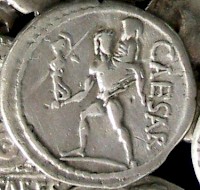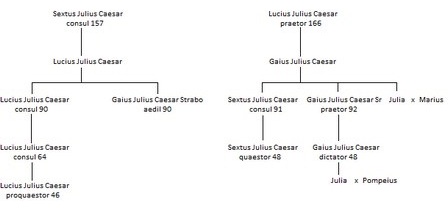Sextus Julius Caesar
Sextus Julius Caesar (†90 or 89): Roman politician in the first quarter of the first century BCE. In our sources, he is sometimes called Lucius.

The end of the second century BCE witnessed the rise of new families in Roman politics. The reforms proposed by Tiberius and Gaius Sempronius Gracchus, and the supremacy of general Gaius Marius, had deeply shaken the political world. One of the new families was that of the Julii Caesares. They were not completely new, but their power rapidly increased, which is also indicated by their claim that they descended from the goddess Venus.
The leading Julians were Lucius Julius Caesar (praetor in 94, consul in 90, censor in 89) and his younger brother Gaius Julius Caesar Strabo (aedile in 90). Two other members of the family were Gaius Julius Caesar (father of the dictator with the same name) and Sextus Julius Caesar. It is not known how the branches of the family were related.
 Of these four men, Sextus Julius Caesar is the least well-known. Probably in 94, he was praetor (together with his relative Lucius Julius Caesar). He may have occupied a governorship, and was back in Rome in 91, to be consul.
Of these four men, Sextus Julius Caesar is the least well-known. Probably in 94, he was praetor (together with his relative Lucius Julius Caesar). He may have occupied a governorship, and was back in Rome in 91, to be consul.
It was to be a difficult year. A tribune named Marcus Livius Drusus proposed several reform bills and asked support from the Italian allies of Rome. However, he was unable to give them the Roman citizenship he had promised, and was murdered. Immediately, the allies revolted: the beginning of the Social War, which started with many Roman reverses. Consul Sextus Julius Caesar went to the front, but lost a battle against the Samnites and died during the siege of Asculum.
His son, also called Sextus Julius Caesar, was a friend of the famous Gaius Julius Caesar and commanded one of his Syrian legions.